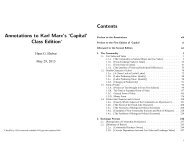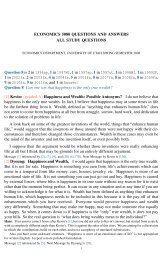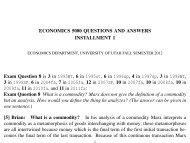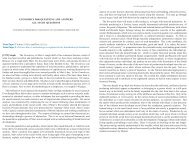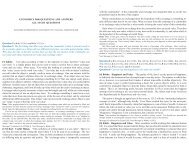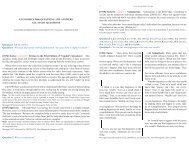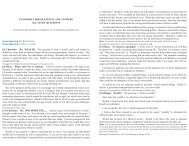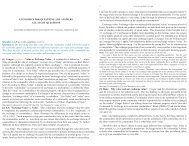Question 1 What did Marx mean with his formu - University of Utah
Question 1 What did Marx mean with his formu - University of Utah
Question 1 What did Marx mean with his formu - University of Utah
You also want an ePaper? Increase the reach of your titles
YUMPU automatically turns print PDFs into web optimized ePapers that Google loves.
U <strong>of</strong> <strong>Utah</strong> Econ 5080 2007fa 67<br />
I would not say commodities are the “basis” <strong>of</strong> capitalism. The basis <strong>of</strong> capitalism is the pr<strong>of</strong>itmaking at the<br />
expense <strong>of</strong> the wage laborers. T<strong>his</strong> is an exploitative process which is difficult to understand because it takes the<br />
form <strong>of</strong> an equal commodity exchange. Commodities are a surface category.<br />
Next Message by Kalmerico is [392].<br />
[232] Harmon: Chapter Titles. Commodities are the cornerstone <strong>of</strong> economics. In<br />
order to build a firm foundation you must start <strong>with</strong> that cornerstone and continue building<br />
from there. Value, on the other hand, is a broad topic. If the chapter was called “Value”,<br />
it would be unorganized because there would be too much information in that beginning<br />
chapter. Many commodities have different aspects to them. Therefore, commodities need<br />
to be explored in the first chapter before values can be assigned to them. The first chapter<br />
is called “Commodities” because it talks about the different values <strong>of</strong> commodities and not<br />
vice versa.<br />
Hans: <strong>Marx</strong>’s concept <strong>of</strong> value is not broad but very simple: it is congealed abstract labor. See my comments<br />
to [697] about that. T<strong>his</strong> value is not assigned to the commodities, but commodities get t<strong>his</strong> value when they are<br />
produced.<br />
Next Message by Harmon is [236].<br />
[237] Melissa: graded A Which comes first... The first chapter is called “Commodities”<br />
because to build on the ideas <strong>of</strong> value and where value comes from you need a solid base.<br />
The solid base is the commodity, the commodity is something concrete. I do believe that<br />
commodities and values are closely related and they build on each other. Starting <strong>with</strong> the<br />
discussion on commodities gives the readers a better understanding <strong>of</strong> the abstract ideas <strong>of</strong><br />
what “value” is. You start <strong>with</strong> the basic and move out from there.<br />
Next Message by Melissa is [397].<br />
[254] Desk: Commodity First. Commodities are the cornerstone <strong>of</strong> what <strong>Marx</strong> wants us<br />
to understand. He does not just give a definition but an analysis <strong>of</strong> what a commodity is. In<br />
<strong>Marx</strong>’s theory, a commodity has value, the fact that it has value implies straightaway that<br />
people try to economise its use. A commodity also has a use value, an exchange value and a<br />
price. It has an order and commodity is an ideal starting point.<br />
Hans: It is good that you said <strong>Marx</strong> analyzes the commodity. <strong>Marx</strong> gets to the important underlying concepts by<br />
t<strong>his</strong> analysis. The commodity is something simple and visible; it is the entrance door to the hidden motive powers.<br />
The metaphor “cornerstone” does not really capture t<strong>his</strong>.<br />
Next Message by Desk is [314].<br />
[262] Walmart: The idea <strong>of</strong> value comes from commodities being produced, sold, and<br />
traded on the market. The explanation has to start <strong>with</strong> commodity because that is the<br />
concept <strong>Marx</strong> uses throughout the rest <strong>of</strong> <strong>his</strong> work to explain the parts <strong>of</strong> a system. The<br />
concepts are all related because they have a central theme, which is the commodity. It is<br />
also convenient to start <strong>with</strong> commodity because a commodity has value as its essence. The<br />
value comes from the abstract labor which was put into the creation <strong>of</strong> that commodity.<br />
The exchange-value comes from the interplay <strong>of</strong> social relations <strong>of</strong> the market. Important<br />
aspects <strong>of</strong> market economy (wages, costs, pr<strong>of</strong>its, demand, and so on) all stem from t<strong>his</strong><br />
basic explanation <strong>of</strong> commodity, whose analysis points to value. The title and structure <strong>of</strong><br />
<strong>his</strong> analysis paints a much clearer and connected picture <strong>of</strong> capitalism, as opposed to starting<br />
from an important aspect <strong>with</strong> many premises <strong>with</strong>out explanations.<br />
Hans: “Value” is the concept capturing the essence <strong>of</strong> capitalism better, while “commodity” has more to do <strong>with</strong><br />
the form which t<strong>his</strong> essence takes.<br />
Next Message by Walmart is [263].<br />
68 2007fa Econ 5080 U <strong>of</strong> <strong>Utah</strong><br />
<strong>Question</strong> 150 is 66 in 1995WI, 75 in 1995ut, 79 in 1996sp, 85 in 1997WI, 87 in 1997sp, 83<br />
in 1997ut, 113 in 2002fa, 116 in 2003fa, 131 in 2005fa, and 156 in 2008SP:<br />
<strong>Question</strong> 150 Why can commodities not express their values in their own use-values? (Note<br />
that we are not asking here why the value <strong>of</strong> a commodity is not determined by its use-value.<br />
The expression <strong>of</strong> value is not the same as the determination <strong>of</strong> value.)<br />
[721] Tomb: commodities and expressing use value. Commodities cannot determine or<br />
express their values through their own use values for a couple <strong>of</strong> reasons. First, a commodity<br />
obtains use value because someone has a use for that commodity. But that is not how it<br />
obtains its value on the open market. Its value is expressed as exchange value on the open<br />
market because another person has a use value for the product. Only through exchange can<br />
commodities express their values.<br />
Hans: Despite the hint in the question that the expression <strong>of</strong> value should not be confused <strong>with</strong> its determination,<br />
you are writing “commodities cannot determine or express their values” as if t<strong>his</strong> was the same thing, and you talk<br />
about a commodity “obtaining” its value.<br />
In section 3 <strong>of</strong> chapter One, <strong>Marx</strong> discusses how value is expressed, i.e., how the invisible fact that commodities<br />
have socially necessary labor in them makes itself felt in the interactions <strong>of</strong> the commodity traders.<br />
First Message by Tomb is [294].<br />
<strong>Question</strong> 162 is 69 in 1995WI, 77 in 1995ut, 80 in 1996sp, 81 in 1996ut, 87 in 1997WI, 90<br />
in 1997sp, 86 in 1997ut, 142 in 2005fa, and 186 in 2010fa:<br />
<strong>Question</strong> 162 <strong>What</strong> does <strong>Marx</strong> understand to be the riddle <strong>of</strong> money? And how does he<br />
solve t<strong>his</strong> riddle in section 3?<br />
[82] Melissa: graded A Riddle t<strong>his</strong>... <strong>Marx</strong> understands that the riddle <strong>of</strong> money is that<br />
money can buy everything. <strong>Marx</strong> also understands that there is a link between money and<br />
production. A commodity is given its value by looking at how much <strong>of</strong> society’s limited<br />
labor hours has been exhausted. <strong>What</strong> the consumer gets out <strong>of</strong> it or what the consumer as<br />
an individual feels the value should be, does not play a part in assigning the commodity’s<br />
value.<br />
I agree <strong>with</strong> Sms [1995WI:546] from the 1995WI archive that <strong>Marx</strong> solves the riddle by<br />
looking at the “...analysis <strong>of</strong> the relative form <strong>of</strong> value and the equivalent form <strong>of</strong> value, and<br />
their divisions between different commodities.”<br />
Hans: In other words (making your second paragraph less abstract), money can buy every commodity because it<br />
is the commodity’s own equivalent form <strong>of</strong> value split <strong>of</strong>f into a specialized commodity (gold).<br />
Next Message by Melissa is [149].<br />
<strong>Question</strong> 163 is 125 in 2003fa, 142 in 2004fa, 143 in 2005fa, 160 in 2007SP, 166 in<br />
2008fa, and 188 in 2010fa:<br />
<strong>Question</strong> 163 Why doesn’t <strong>Marx</strong> say that the simplest value relation is that between commodity<br />
and money?<br />
[78] BHales: Commodities and Money. In TimJim’s assertion in [2005fa:243] he addresses<br />
why the simplest value relation is not between money and commodity. TimJim states<br />
that money is just a median form <strong>of</strong> exchange between two items. I agree <strong>with</strong> t<strong>his</strong> assertion.<br />
The simplest form <strong>of</strong> exchange is the direct exchange between two commodities. In societies<br />
before currency existed, direct exchange was the simplest form <strong>of</strong> exchange between



